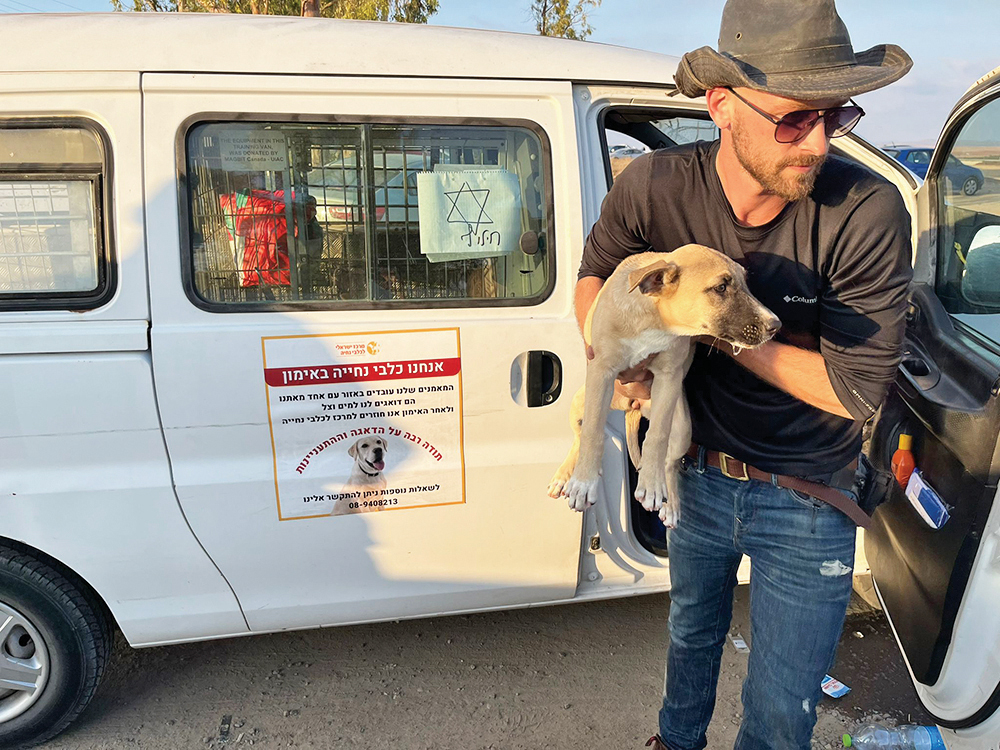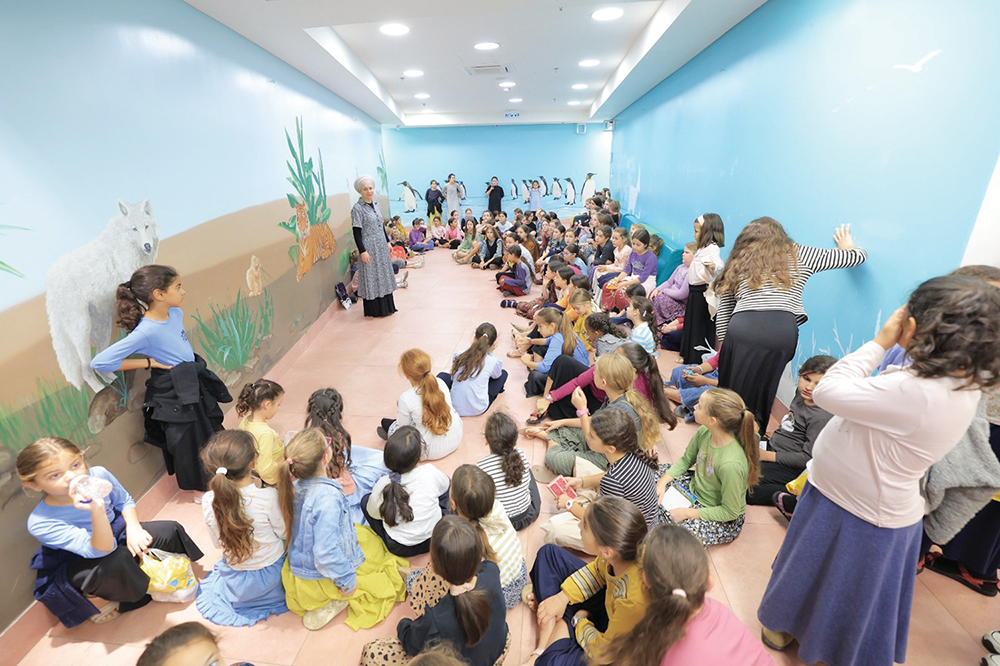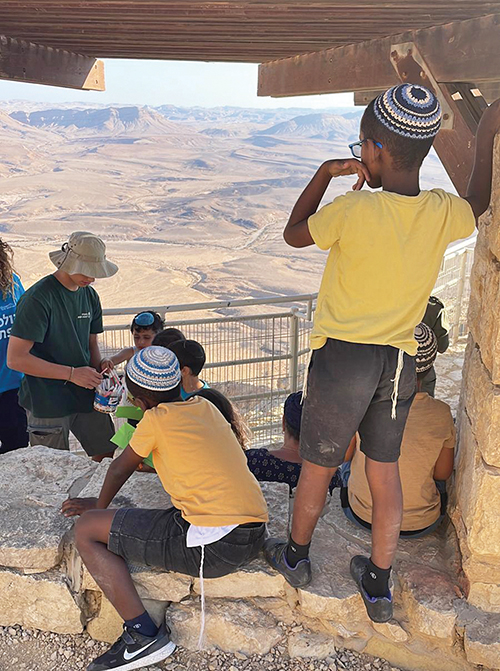
The horrific war in Israel has impacted and shattered countless lives and communities. Every home in Israel has been affected and is grieving, with family members in shock, traumatized, angry and fearful about what’s to come.
People of all ages from communities in Southern Israel have been evacuated by the Israeli government. These individuals and families have had their homes destroyed and need to escape the relentless barrage of rockets. They have experienced severe trauma and are in need of comfort and professional support.
That is why Israeli organizations are mobilizing their resources as crisis centers. The Shalva National Center and The Society for the Protection of Nature in Israel (SPNI) are just two of the many Israeli non-profit organizations that have shifted their focus at this time to assist Israeli refugees and others whenever and wherever they are needed.
The Shalva National Center, located in the heart of Jerusalem, offers inclusion services and support for those with cognitive and physical disabilities. Shalva was founded in 1990 by Rabbi Kalman Samuels and, since its inception, it has become a model of inclusion that has been replicated across the world.
Over the past weeks, the center has taken on a very unique role, mobilizing its resources to become the Shalva National Crisis Response Center, opening its doors to evacuees from the war. Within a few days of Hamas’ brutal attack on October 7, hundreds of people who had been evacuated from the southern border towns of Israel began arriving.

“While the Shalva National Crisis Response Center has been called on many times, in the past we have been there for people caring for family members with disabilities who are being evacuated in times of attacks in Gaza and from fires in the North of Israel,” said Rabbi Samuels, president of Shalva. “We have never, thank God, been asked to bring in so many people in one go and for such an extended period. We are committed to doing everything we can, to help as many people as possible, in what is such a dark time in Israel’s history. We sincerely hope that all of the people sheltering with us now will be able to return to their homes soon and rebuild their lives with safety and security, and the light will once again shine in our beautiful homeland.”
Yochanan Samuels, CEO, Shalva, commented, “We are working around the clock to ensure the 1,000 children and adults who attend Shalva’s programs are able to continue coming to our center at this time, when continuum of care is so vital and when so many families are struggling. We are, at the same time, working closely with the Home Front Command ensuring we have all of the necessary supplies to ensure Shalva is able to help as many evacuees as possible. We have prepared for this for many years and will do everything we can to make sure they receive the physical, emotional and therapeutic support they so desperately need.”
Shalva is anticipating that, over the coming weeks, the Shalva National Crisis Response Center will be receiving an additional 1,000 evacuees from across Israel. And while providing for their physical needs, Shalva is also ensuring that there will be enhanced security, rehabilitative stability and the social and emotional support evacuees require to enable them to begin to process this trauma.
Taken from Shalva video clips, evacuees spoke about their experiences:
“Shalva opened their doors, their hearts and their facilities for us. They helped us and our children to feel safe and sturdy in this traumatic time we are going through and we are so grateful,” Mindy Tzor, an evacuee from Yishuv Naveh, said.

Rabbi Yaron Levy from Moshav Naveh, located on the northern border of the Gaza Strip, said, “We’ve been through three really stressful days. It started with waking up with sirens, then being closed in bomb shelters, sometimes without electricity, and the understanding that we are at war. It was only on arriving here that I realized how tense I was and how I could finally let go. I don’t have to be on guard duty anymore. It’s really amazing. Am Yisrael Chai!”
The Shalva Center was designated by the Home Front as a National Emergency and Response Center. It is uniquely prepared for its new role because of its incomparable size and scope. The structure of the center incorporates a steel and cement-based core, which extends both horizontally and vertically throughout the 11 stories of the 20,000sqm building. Several bomb shelters and safe rooms are located on every floor of the center and allow anyone quick access from any point in the building, without involving extensive distances or stairs. The building’s foundation is fixed into the side of a mountain, such that five of the 11 floors are below street level and are enveloped by the mountain, preventing the possibility of complete penetration of a rocket into the building. Three of these floors, which typically function as a sports center and parking lot, are completely underground and offer the ultimate shelter, likened to a military bunker. They can be converted to bed bays if needed.
And Shalva has even taken its services a step further at this time.
Gaby Hirsch, chief development officer, Shalva, said, “We have also just opened a program for families who have been evacuated, are staying in the Jerusalem area and have a child with disabilities. The program runs all morning, and includes breakfast and lunch, giving the family a break from caring for their child and giving the child an opportunity to spend time with other children, to unwind and make use of Shalva’s accessible sports and rehabilitation facilities.”
“Shalva is committed to ensuring the safety and well being of everyone who seeks refuge, and seeing the joy on the faces of the children after all they’ve been through is really special,” said Yochanan Samuels.
The Society for the Protection of Nature in Israel has also mobilized its resources and transitioned into providing war-time emergency shelter and educational respite programs. Founded in 1953, SPNI is the largest environmental organization in Israel.
“SPNI is in solidarity with the whole country. Our field schools are set up for hospitality. These are places where people can stay; [we are] providing housing to people who need housing,” shared Rachel Canar, executive director, ASPNI (American Society for the Protection of Nature in Israel).
“Sheltering is free to families and includes full board, food, dining hall facilities, laundry services and cleaning,” Canar continued. “Educational and recreational activities are provided, including a wide array of children’s programming taking place in the field schools and hotels in Eilat and the Dead Sea region. Every day SPNI provides both in-person programming and Zoom programming. The Zoom programming for children is for all children in Israel. Since there is no school in Israel, this programming is for everyone. About 1,200 children see the Zoom programs.”
SPNI is also preparing to turn their entire field school network into war-time housing for different groups. In their Alon Tavor field school, located in the lower Galilee, and in the Ein Gedi field school on the Dead Sea, under a contract with the Jewish Agency, housing is provided for groups of newly arrived Bnei Menashe. SPNI has provided housing to migrant agricultural workers from Thailand who survived the attack near Gaza and have since evacuated. Field schools in Achziv on the Mediterranean coast and the Golan school in Katzin are housing reserve duty units that have been called up and are currently training.
SPNI is now fundraising in order to provide emergency shelter in their field schools to families who have had to flee their homes in Southern Israel, prioritizing those with young children or elderly parents. SPNI has no funds from its regular nature education activities as all such activities have been canceled.
In addition to the above, Israel has not forgotten animals abandoned and trapped because of the war. Individuals and teams are working together to help rescue these animals, demonstrating the wide range of humanitarian efforts going on in Israel.
Noah Kaplan is part of the weekend kennel staff at Israel Guide Dogs Center for the Blind (IGDCB), and is now part of the rescue team in Otef Aza. His team of volunteers had rescued more than 300 dogs at press time.
“We aren’t working with any specific organization; [we are] just a group of like-minded volunteers rescuing animals together. I’ve been going to the South daily for the past seven days myself. Sometimes we need to wait for a few hours on site in order to receive permission from the Israel Defense Forces (IDF) to go into the area,” said Kaplan.
One anecdote Noah related to IGD: “We were in Sderot and found a German Shepard wandering the streets. When we got out of the van, he ran straight for us. We took him and scanned his chip. That evening we reunited him with his family. We were privileged to witness this very emotional reunion.”
For more information and to donate: www.shalva.org or https://shalva.net/donation/
US office Phone number is: 212-725-0900
For more information and to donate: 800-411-0966, http://www.natureisrael.org
https://my.israelgives.org/en/fundme/ShelterforFamilies#tab3_sec1.
For more information, to assist, or to donate: https://israelguidedog.org, gail@israelguidedog.org 215-343-9100
Susan R. Eisenstein is a longtime Jewish educator, passionate about creating special, innovative activities for her students. She is also passionate about writing about Jewish topics and about Israel. She has two master’s degrees and a doctorate in education from Columbia University.










